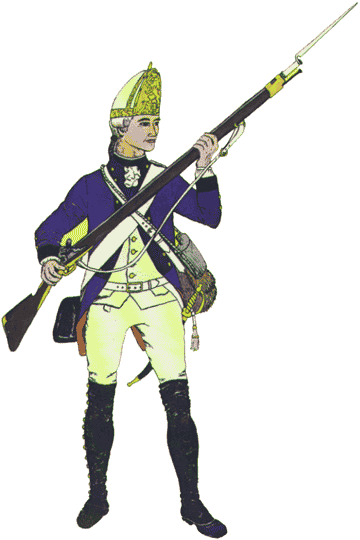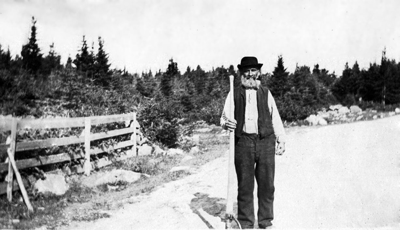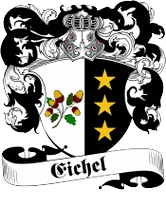The Hessians
1880 NT Times - The Hessians...
THE HESSIAN SOLDIERS
CHARACTER OF THE TROOPS HIRED BY KING GEORGE.
HOW THE MEN "WERE RECRUITED—COLLECTED TOGETHER AND DRIVEN
OFF LIKE CATTLE—CRUEL MEASURES TO PREVENT DESERTION—THE RANK AND FILE.
DRESDEN, Nov. 20.—The soldiers whom the
Landgrave of Hesse Cassel and the other German Princes had let out to
England for the suppression of the American rebellion were brought
together, in great measure, by the recruiting system. Some alterations
had, it is true, been introduced into this system in Cassel by the
adoption of a new plan similar to that of Prussia. The country was cut
up into districts, each of which was to furnish a given number of
recruits to a certain regiment. But this measure does not seem sensibly
to have diminished the activity of the old-fashioned recruiting
officers or to have improved the spirit of the Army; nor does it appear
to have existed in most of the States.
Parties or single officers were sent all over Germany to
coax or force men into the service. Persons who were not born subjects
of the Prince were preferred, on the ground that natives could always
be called in, in case of need, and it was published in the Army
regulations that officers would especially recommend themselves by
their zeal in enlisting foreigners. Spend-thrifts, loose livers,
drunkards, arguers, restless people, and such as made political
trouble, if not more than 60 years old and of fair health and stature,
were forced into the ranks. The present of a tall, strapping fellow was
an acceptable gift from one Prince to another, and in every regiment
were many deserters from the service of neighboring States. Together
with this mixed rabble served the honest peasant lads of Germany,
forced from their plows. It may be noted as a general rule in respect
to the regiments sent to America that these first furnished by any
given Prince would contain a larger proportion of his own subjects, and
a better set of men generally, than these subsequently levied.
Johann Gottfried Seume, who afterward attained some
prominence as a writer, was a victim of the recruiting system, and has
given an account of his adventures. Seume was a theological student at
Leipsic, and having conceived religious doubts which he knew would be
offensive to his friends, left that city on foot for Paris, with a
sword at his side, a few shirts, and a few volumes of the classics in
his knapsack, and about 9 thalers in his pocket. His journey, however,
was destined to take a different direction. “The third night I spent at
Bach," writes he, "and here the Landgrave of Cassel, the great broker
of men of the time, undertook, through his recruiting officers and in
spite of my protestations, the care of my future quarters on the road
to Ziegenhayn, to Cassel and thence into the New World. I was brought,
under arrest, to Ziegenhayn, where I found many companions in
misfortune from all parts of the country. There we waited, to be sent to
America in the Spring, after Faucitt should have inspected us. I gave
myself up to my fate, and tried to make the best of it, bad as it was.
"We staid a long time at Ziegenhayn before the necessary number of
recruits was brought together from the plow, the highways, and the
recruiting stations.
The story of these times is well known. No one was safe from
the grip of the seller of souls. Persuasion, cunning, deception,
force-all served. No one asked what means were used to the damnable
end. Strangers of all kinds were arrested, imprisoned, sent off. They
tore up my academic matriculation papers, as the only instrument by
which I could prove my identity. At last I fretted no more. One can
live anywhere. You can stand what so many do. The idea of crossing the
ocean was inviting enough to a young fellow, and there were things
worth seeing on the other side. So I reflected. "While we were at
Ziegenhayn old Gen. Gore employed me in writing, and treated me very
kindly. Here was an indescribable lot of human beings brought together,
good and bad, and others that were both by turns. My comrades were a
runaway son of the Muses, from Jena; a bankrupt tradesman, from Vienna; a
fringe-maker, from Hanover; a discharged secretary in the Post Office,
from Gotha; a monk, from Würzburg; an upper steward, from Meiningen; a
Prussian Sergeant of Hussars; a cashiered Hessian Major, from the
fortress itself, and others of like stamp. One can imagine that there
was entertainment enough, and a mere sketch of the life of these gentry
would make amusing and instructive reading. "A plot was gotten up
among this rabble. Seume was offered the command of the conspirators,
but, by the advice of an old Sergeant, declined the dangerous honor.
The mutineers were to rise in the night, surprise the guard and take
their weapons, hew down such as opposed them, spike the cannon, lock up
the officers at head-quarters, and march 1,500 strong across the
frontier, which was but a few miles away. The plot was disclosed. The
ringleaders were arrested, Seume among them. He was soon re-leased,
however, for too many men were implicated to allow the punishment of
all concerned. " The trial went on," he says; " two were condemned to
the gallows, as I should certainly have been had not the old Prussian
Sergeant-Major saved me. The remainder had to run the gantlet a great
many times, from 36 down to 12. It was a terrible butchery. The
candidates for the gallows were pardoned after suffering the fear of
death under that instrument, but had to run the gantlet 30 times, and
were sent to Cassel to be kept in irons at the mercy of the Prince.
“For an indefinite time” and “at mercy” were then equivalent
expressions, and meant “forever without release”. At least the mercy of
the Prince was an affair that no one wanted to have anything to do
with. More than 30 were terribly treated in this way; and many, of whom I
was one, were let off only because too many of the accomplices would
have had to be punished. Some came out of prison when we marched away,
for reasons which were easy to understand; for a fellow that's in irons
at Cassel is not paid for by the British."
With troops collected as these were, desertion was
necessarily common. The military service was dreaded, and in the smaller
States a run of a few miles would take the deserter beyond the
frontiers. The people sympathized with him and would gladly help him,
if not restrained by terrible punishments. These, however, were not
wanting. In Würtemberg, when the alarm was given the parish must
instantly rise and occupy roads, paths, and bridges for 24 hours, or
until the fugitive was caught. Should he escape, the place must furnish
a substitute as tall as the deserter, and the sons of the principal
man of the village were first liable. This order was to be read every
month from the pulpit. Whoever helped a deserter lost his civil rights
and was imprisoned with hard labor and flogged in prison.
The laws of Hesse-Cassel appear to have been a little less
savage. Peasants arresting a deserter received a ducat, but if the
fugitive passed through a village without being arrested the village
was liable to pay for him. Every soldier going more than a mile from
his garrison was to be furnished with a pass, and all persons meeting
him at a greater distance from home were required to demand it.
A characteristic incident occurred in 1738. A Prussian
recruiting officer and a Prussian soldier's wife induced a Bayreuth
soldier to desert for the purpose of re-enlisting in the Prussian Army.
The woman was hanged; the officer was obliged to be present at her
execution, and was then locked up in a fortress. The deserter seems to
have escaped with his life, being a valuable merchantable commodity.
Having enlisted his recruit, perhaps under a foreign jurisdiction, the
officer was obliged to get him to his garrison.
This would, of course, afford opportunities for desertion,
and Kapp quotes from a book printed in Berlin as late as 1805 the
precautions to be taken against this danger. The under officer who is
escorting a recruit must wear sword and pistol. He must make the
recruit walk in front of him, and warn him that a single false step may
cost him his life. He must avoid large towns and places where the
recruit has previously served as much as possible. It is also desirable
to avoid the place where the recruit was born. They must spend the
night at inns where the landlord is known to be well-disposed to
recruiting officers, and sure to side with them and not with their
victim. The recruit and the officer must both undress, and their
clothes be given to the landlord for safe-keeping. Inns where recruits
are to spend the night must have a separate room for the purpose, if
possible up stairs, and with iron-barred windows. A light must be kept
burning all night, and the under officer must give up his weapons to
the landlord, for fear the recruit should get them away from him and
use them against him in the night. In the morning he must get them to
the loading, and priming, dress himself, and be ready for his journey
before the clothes of the recruit are brought to him. The recruit must
enter a house or a room first, he must come out last, At meals he must
sit behind the table, next to the wall. If he shows signs of being
troublesome, the straps and buttons must be cut off his breeches and he
must held them up with his hands. A good dog trained to the business
was found to be very useful to an under officer in such circumstances.
If an under officer is unfortunately obliged to kill or wound a recruit
he must bring a paper from the local magistrate. But no document will
excuse the escape of a recruit, an accident which the Prussian military
imagination refuses to consider over necessary.
The men collected to serve in America we're of various
qualities from a military point of view. They were all received and
examined by English Commissioners at the seaports, before shipment, and
while some of the regiments were pronounced excellent, others were
said to be partly made up of old men and boys, unfit to endure the
hardships of a campaign. Some soldiers wore rejected for these causes,
especially in the latter years of the war, when good men were harder to
get in many of the States. It is not easy with the documents before me
to judge what chance a private had of promotion from the ranks. Seume
writes that he himself had hopes in that direction, which were
shattered by the ending of the war, as in time of peace no one who was
not noble could aspire to be anything more than a Sergeant-Major, Kapp
speaks of the officers as belonging mostly to the lower nobility.
The list of Hessian officers (Hesse-Cassel) in 1779, as
given by Eelking, does not bear out these statements. It appears that at
that time the majority of the officers were not noble, nobility being
judged by the presence or absence of the mystic particle von.
Especially was this the case in the ranks below that of Major, where
the officers of common birth outnumbered the nobles nearly two to one.
Of the Majors, 8 were noble, 11 not noble. Of Generals, Colonels,
and Lieutenant-Colonels, 28 were noble and 9 not noble. It would seem
from these figures that the commoner must have found a sticking point
in his advancement at the rank of Major. It is, however, probable that
superior officers of merit were often ennobled. Of Quartermasters,
Adjutants, Commissaries, doctors, chaplains, &c, none were nobles
except the Quartermaster-General and one Adjutant. Again, in some
regiments the proportion of noble officers was much larger than in
others. The relation between officers and soldiers was, of course,
thoroughly despotic, but tempered at times by good-nature toward
particular soldiers. Thus Seume, who was educated, and a favorite, was
on terms of intimacy with some of the officers of his regiment.
We come at last to the character of the officers. Their
education was generally confined to a limited amount of writing and a
little barbarous French. They understood neither the cause for which
the Americans were fighting, nor the language in which the statesmen of
both contending parties argued their different claims. But had they
understood far more than they did, their sympathies would still have
been on the side of royal prerogative against popular freedom. This was
not necessary to make them go where they were ordered, nor would it
have prevented many of them from heartily wishing themselves at home
again, after a campaign or two in America.
The Landgrave of Hesse-Cassel took a personal interest in
his troops when on foreign service. He corresponded with the officers
and meted out praise and blame. He refused promotion to these who had
been captured at Trenton until they had effaced that disgrace by
subsequent good conduct. As for the rank and file, in spite of the
gross injustice with which they had been treated, there are many signs
that these involuntary volunteers were not such bad fellows after all.
The Germans have their fair share of these virtues which
every nation is fond of claiming as its peculiar birthright— honesty,
courage, kindliness. The motley mass had been shaped and welded by a
rigorous, if often cruel, discipline. These were no freelances, but
modern soldiers. They could not wipe out to American eyes the shame of
their mercenary calling. But the shame fairly belonged to their Princes
and not to themselves. In the field or in captivity, they often
deserved, and sometimes obtained, the respect of their opponents. Many
of them became, in the end, citizens of the Republic they were sent to
destroy.
It is not many years since survivors of our own
Revolutionary Army were still living among us. They were duly honored by
the people, and as their ranks became thinned by time, were in great
request for Fourth of July celebrations and patriotic banquets. A story
was then current that in a certain village on the eve of the Fourth
the committee found themselves without a revolutionary veteran. The
local soldier had died, or been enticed away to the more splendid
festivities of a neighboring town. What was to be done? Someone at last
suggested that an old man had appeared that day at the inn. He looked
old enough to be a veteran. There was no harm in asking. A
sub-committee waited on the stranger and announced its errand. Oh, yes!
He had fought in the Revolution. The old man was given a prominent
place next day in the procession, and a high seat at the banquet. His
health was drank, and he rose to respond. “l Ladies and gentlemen,"
said the old man, "I fought in the Revolution. Unfortunately, I fought
on the wrong side. I am one of the Hessians." A murmur went through the
patriotic assembly. An imaginative lady thought she smelt sulphur. The
committee were aghast, "But," continued the veteran, "we were beaten,
and I'm glad of it. I settled here in America, and have been a good
citizen these 50 years. God save the United States!" He sat down amid
thunders of applause, and the inhabitants of that village were
unanimous that they had never had so successful a Revolutionary
veteran.
E.J.L.
The New York Times
Published: December 23, 1880
Copyright © The New York Times


